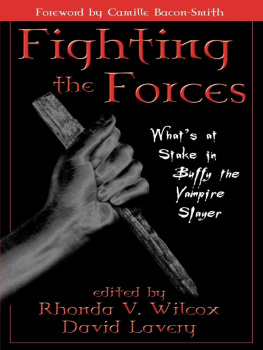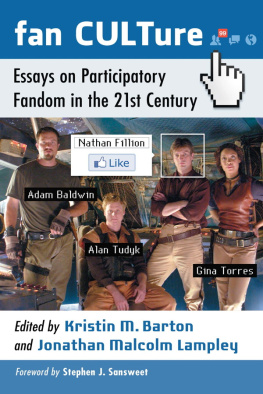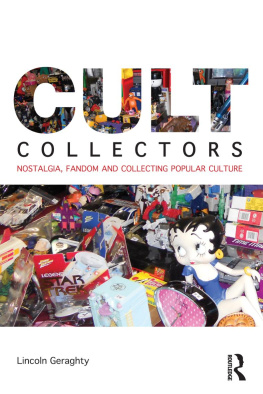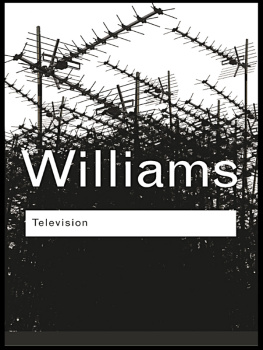A big thank you to everyone at Bloomsbury for being supportive of the idea of this book, especially Katie Gallof, who was enthusiastic and encouraging about the proposal from the start. Id also like to thank Mary Al-Sayed, who was fabulous with the design and production process and helped make the book look wonderful.
A huge thank you to my current and former colleagues at the University of South Wales, particularly Ruth McElroy, Caitriona Noonan, Steve Blandford, Stephen Lacey, Rob Campbell, Richard Hand, Ben Lamb and Huw Jones. Students on my modules on Digital Media & Society, Media Audiences & Fandom, and Media & Culture in Wales have consistently challenged and developed my ideas about contemporary media and Ive enjoyed all of our debates and discussions. Outside of this project, Ive been fortunate enough to work with other fantastic colleagues and editors in television and audience studies, including Kim Akass, Janet McCabe, Sarah Cardwell, Melissa Click, Mark Duffett, Stacey Abbott and Lorna Jowett. Thanks also to Matt Hills for the years of academic support, encouragement and friendship.
Huge thanks to the Fan Studies Network team of supportive colleagues and friends: Lucy Bennett, Bertha Chin, Bethan Jones, Richard McCulloch and Tom Phillips. To other wonderful friends made in academia and continued in the real world: Nash Jimenez, Inger-Lise Kalviknes Bore, Darren Kelsey, Choon Key Chekar, Janet Harris, Rachel Cohen and Emma Cooke. Outside of academia, a raft of support has come from Stacy Lynch, Rachel Pugh Alexander, Beth Setters, Claire Penny, Steph Wall, and Katie Hicks.
My family have been endlessly supportive of my academic career, so heartfelt thanks to Mum and Dad, and Gareth and Emma. Thanks, finally, to Ross. Despite all my thinking and writing about endings, I know that theres one I dont have to worry about.
Aspects of Chapters 2 and 5 have appeared in the following journals: Popular Communication and Participations: International Journal of Audience Research .
I am now officially, decidedly 100% OVER Angel: the Series! I feel like now I can finally let it go and move on with my life. Just remember it for the phenomenal show it once was, but with the serene peace of having accepted that its over and done, never to return.
Questionnaire respondent, 2003
If texts no longer end, they still have endings that are enormously meaningful to both fans and creators.
Harrington 2013, 591
Among the countless memorable moments that television programmes have given us, it is perhaps the final scenes of many of these that stick most clearly in the mind. The contested and divisive spiritual focus of Lost s (ABC 200410) finale; the seemingly premature conclusion of Twin Peaks (ABC 19901), which saw lead character Dale Cooper eerily possessed by his supernatural nemesis BOB; the sad postscript to science-fiction drama series Quantum Leap (NBC 198992) that informs the viewer that time-travelling hero Sam Beckett never went home; the ambiguous conclusion of Buffy the Vampire Slayer (The WB 19972001; UPN 20013) spin-off Angel (The WB 19992004), with its final moments depicting the lead characters about to enter into a battle to avoid the apocalypse and their eventual fate left unresolved. As a viewer, and sometime fan of each of these shows, these are some of my own favourite examples. Each reader will surely have their own. However, while academic studies of fandom have examined the process of becoming a fan (Hills 2002, 6), since this is often for most fans, a milestone in their lives in which everything changed (Cavicchi 1998, 153), reactions to the cessation of fan objects have received comparatively less academic attention. However, a consequence of a commercially driven and ever-changing media landscape is that favoured bands split up, movie franchises come to an end, characters depart TV shows and television programmes draw to a close.
This book examines responses to the specific moment when a fan object moves from being ongoing to dormant, yielding no new instalments, and the period of post-object fandom that follows. It focuses on television and also considers how new fans negotiate discovery of shows that have ended and how this is discussed. Accepting the importance of fandom in helping us negotiate our social, political and cultural realities and identities (Gray, Sandvoss and Harrington 2007, 10), the book contributes to a number of key debates in contemporary audience and television studies. Acknowledging that fandom can, and often does, continue through watching DVDs and reruns, collecting merchandise, listening to podcasts or using other online media or conducting ongoing conversations with fellow fans, and that media texts offer a range of endings from character departures to the complete cessation of new episodes of a series, the book explores a range of examples of fandom, transitions and endings.
Fandom is now accepted as an integral part of everyday life which impacts upon how we form emotional bonds with ourselves and others in a modern, mediated world (Gray et al. 2007, 10). What follows focuses on how fans form such bonds, drawing upon sociologist Anthony Giddens (1990, 1992) work on pure relationships to consider how endings may impact upon fans self-identities and sense of ontological security when the cessation of a favorite program creates an emotional void and forced detachment from the program narrative (Costello and Moore 2007, 135). The book provides empirical material to consider responses in the period immediately before the ending of shows, as their final episodes are aired and how fans continue to use and discuss the programmes in the following years. It also explores other moments of separation and detachment for TV fans, such as the departure of favoured characters, the replacing of actors or moments where the return of a show is uncertain. It argues that attention must be paid to fans affective and interpretive responses to such TV events since observation of the way we react to the expiration of a television show offers us another chance to understand the complexities involved in the institution of television as a portion of our social fabric (Anderson 2005, online). Consideration of various genres, such as reality television which eliminates characters on a regular basis and would allow an interesting study of how viewers react when their favorite character is voted off the show (Eyal and Cohen 2006, 519), or soap operas which routinely lose characters over their long-running histories, would offer an even broader range of fan responses. However, the book focuses on fans of television dramas and how they respond to the lack of new episodes of their fan objects but, in many cases, continue to engage with these objects. Many of the shows discussed here have been subject to prior academic study including (FOX 200110), The West Wing (NBC 20006), Lost , Doctor Who (BBC 196389, 2005), Torchwood (BBC Wales/Canadian Broadcasting Company 2006; BBC Worldwide/Starz Entertainment 201011), The X-Files (FOX 19932002), Twin Peaks , Angel , Firefly (FOX 2002) and Sex and the City (HBO 19982004). Discussing a range of drama series allows consideration of programmes that span different periods of longevity from those that continued for up to eight seasons and had a definite end point, to those that were cancelled prematurely and had much shorter television lifespans. The book takes a comparative approach by focusing specifically on fan audiences and considering these during the period of cancellation and beyond. The book thus contributes to debates around television fandom in three distinctive ways:







